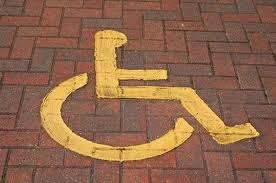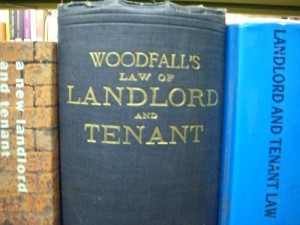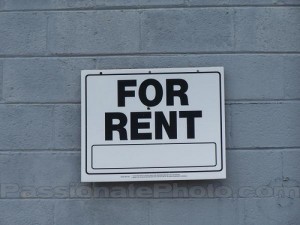Posted by Teresa on November 7, 2012 under Landlord and Tenant FAQs, Lease and Rental Agreements | 
 A landlord recently asked if her tenant, who claimed her roommate had abused her, would be allowed to break her lease.
A landlord recently asked if her tenant, who claimed her roommate had abused her, would be allowed to break her lease.
Good question! Many abuse victims do not feel safe in their homes, even with protective orders against their abusers. Others, as in the case above, actually live with their abusers. In either case, the desire to move can be strong—even if it means breaking a lease. Should victims of domestic abuse be allowed to get out of a lease before it is up? Should penalties be waived? And who should carry the financial burden, the tenant, his or her roommates, or the landlord?
The first thing a landlord should do is to check state laws, and if applicable, any local statutes that cover domestic abuse and tenant rights. Under most landlord-tenant laws, the tenant cannot be excused from paying rent when he or she breaks a lease before it expires. In some places, the landlord is not required to re-lease the unit, and the tenant is responsible for rent until the end of the lease. In others, the landlord has a duty to attempt to re-lease the rental unit.
Many states have passed legislation giving domestic abuse victims the right to break a lease without penalty or paying future rent. They include New York, New Jersey, Oregon, Washington, Minnesota, North Carolina and others. Check your state’s landlord-tenant laws to determine whether it has passed such legislation. Many require the victim to notify the landlord of intention to terminate the lease. The required notice may be 30 or 60 days. Some require proof of abuse, such as a protective order or police report.
Most landlords realize that having a domestic violence situation on their property is not good. But it’s also true that tenants who move out before their leases are up cause financial hardships. Certain states make it easier on the landlord by requiring the vacating tenant to pay rent for the month in which they leave. In others, they are required to pay two months’ rent.
If you receive such a notice from a tenant, check your states law and proceed accordingly.
Posted by Teresa on September 6, 2012 under Fair Housing Act, Landlord and Tenant FAQs | 
 While renting to disabled tenants is common for many landlords and property managers, some have never had a disabled person submit a rental application. This post will clear up what might be some unknowns.
While renting to disabled tenants is common for many landlords and property managers, some have never had a disabled person submit a rental application. This post will clear up what might be some unknowns.
It’s important to know that disabled persons are protected by law. The Fair Housing Act (FHA) protects people with physical or mental disabilities that substantially limit one or more major life activities. These disabilities include mobility, hearing and visual impairments, chronic alcoholism, mental illness, HIV/AIDS and mental retardation. Landlords may not discriminate against these people, nor against those who have a history of such disabilities or are regarded by others as though they have such a disability (in other words, have no formal diagnosis).
- Landlords are not allowed to request medical records or ask prospective tenants if they are disabled.
- Landlords must not assume a prospective tenant cannot live in certain housing. For example, an applicant in a wheelchair cannot be told there are no vacancies if a third-floor apartment is available.
- Landlords may not turn down mentally disabled applicants on the basis of their condition alone. If they have threatened or harmed others in the past, then that could be grounds for rejection.
Reasonable Accommodations
At their expense, landlords must accommodate disabled tenants within reason. This means adjusting rules such as where garbage must be placed or allowing a close-by parking space. Each of these would fall under the “reasonable” category. Installing an elevator so a tenant who uses crutches can reach an upstairs unit would not.
Disabled tenants must be allowed to make reasonable modifications to their rental units or common areas in order to live comfortably and safely. For example, a tenant with a wheelchair-bound child must be allowed to widen the doorway to the bathroom and install bars around the tub and toilet at their own expense. Furthermore, the landlord may not require the tenant to return the doorway to its original condition (since it does not interfere with the next tenant’s use and enjoyment of the premises) but may require the tenant to remove the grab bars and return the walls to their original condition.
Other examples of reasonable accommodations include lowering countertops in the kitchen for a tenant using wheelchairs, installing an extra-loud doorbell for a hearing-impaired tenant or altering appliances so a visually impaired tenant can use them. All of these modifications must be requested verbally or in writing, approved by the landlord and paid for by the tenant. Landlords may ask for the unit to be returned to its original condition upon termination of the lease.
Landlords are permitted to ask for a description of proposed modifications, along with proof they will be done according to the law and in a workman-like manner.
Have questions? Learn more with the U.S. Department of Justice and Department of Housing and Urban Development’s joint statement on the subject, which can be found here.
Posted by Teresa on May 15, 2012 under Landlord and Tenant FAQs, Rents and Deposits | 
 As we reported back in March, some landlords and management companies are forcing tenants to pay rent through online services. Many question whether this is legal or not. The suit filed by the residents of Woodlake Manor Apartments is still moving through the court system, so it’s too soon to tell how that will shake out. But in the meantime, how can you convince tenants to switch over to online rent payment? And is it worth it?
As we reported back in March, some landlords and management companies are forcing tenants to pay rent through online services. Many question whether this is legal or not. The suit filed by the residents of Woodlake Manor Apartments is still moving through the court system, so it’s too soon to tell how that will shake out. But in the meantime, how can you convince tenants to switch over to online rent payment? And is it worth it?
Having rent payments flow automatically into your bank account can be convenient. Collecting checks, posting them in your accounting software, depositing them in the bank (or having your bookkeeper do it) takes time you could be spending on growing your business—or better yet, doing something fun.
Plenty of landlords receive rent payments through a variety of online tools—and neither they nor their tenants would go back to paper checks for anything. It seems most people you know do all their banking and bill paying online. So why not convert your tenants over to online rent payment?
Maybe your tenants won’t or can’t use online services. Perhaps they don’ t all have computers at home. Or they won’t take the time to learn how to use online services. If you are ready to be done with paper checks, maybe it’s time to help them move into the 21st century.
Try incentivizing tenants to transition to online rent payment with these step-by-step ideas:
- Send out a notice to all tenants that you are now offering online rental payment.
- List the benefits, such as avoiding writing and mailing a check, finding a stamp and sending the rent several days in advance of the due date. Online payments are more convenient: rent can be sent electronically on the due date. Tenants can schedule payments ahead of time to cover travel or vacations. Checks can’t get lost in the mail. And, it saves paper!
- Offer a one-time $10 or $25 gift card for tenants who sign up right away for online rent payment.
- You will be notified which tenants choose the online option.
- For those who choose not to use online payment, inform them that beginning with their next lease renewal, you will be requiring them to do so.
- If they still balk, give them the option of paying the entire new rent at renewal (whatever amount you would normally raise the rent) or a lowered amount for paying online.
Landlords may not be able to force all tenants to pay rent online. There will likely be situations where a tenant can’t get to a public library to use a computer, or is not able to understand how to use online banking. And tenants with disabilities are protected under law. Be reasonable and flexible, and collect rent online to the extent that you can.
Protect your rental property and assets through tenant background checks. Proper tenant screening will ensure you are leasing to the best possible tenants.
Posted by Teresa on March 9, 2012 under Landlord Tips, Lease and Rental Agreements | 
 Around the country, landlords, insurance companies and municipalities are responding to reports of attacks and other problems posed by “bully breeds” of dogs—mostly pit bull terriers—by prohibiting residents from owning them. The New York City Housing Authority has banned pit bulls from its properties. Some municipalities around the country have also outlawed the breed.
Around the country, landlords, insurance companies and municipalities are responding to reports of attacks and other problems posed by “bully breeds” of dogs—mostly pit bull terriers—by prohibiting residents from owning them. The New York City Housing Authority has banned pit bulls from its properties. Some municipalities around the country have also outlawed the breed.
On the other side of the argument are the pet owners who love their animals, as well as those who insist their dogs are companion animals, protected by law. In one such case, a 76-year-old tenant has been told she must give up her pit bull or face eviction. Her landlord has received four written complaints about the dog, from teeth-baring and lunging incidents to barking at children. While the tenant has a doctor’s order certifying the dog as a companion animal, other residents feel the dog has not been properly trained, and it’s just a matter of time before a resident or child is hurt.
The American Insurance Association says that dog bites are one of the biggest categories for homeowners’ insurance claims. In assessing risk, and with millions of dollars per year in damage awards, many insurers refuse to cover homeowners with pit bulls, Rottweilers and other breeds deemed “aggressive.”
Some animal protection groups, such as PETA, are calling for bans on breeding pit bulls, while others insist such actions are discriminatory, and that owners need to be accountable for the actions of their dogs.
Landlords have the right to prohibit animals in rental properties, with the exception of companion and service animals for the disabled. If you as a landlord allow animals, you may designate which types your tenants may keep in your property. Some landlords limit dogs by weight; others prohibit snakes and other exotic animals, while others specifically prohibit dog breeds with a reputation for aggressive behavior.
Just be sure your lease agreement clearly states the rules and the consequences of breaking them. Check with your lawyer and your insurance agent to see how allowing these breeds affect your risk.
Posted by Teresa on January 20, 2012 under Eviction, Landlord Tips | 
 Just because you don’t allow subleasing in your rental units doesn’t mean your tenants won’t do it—for a number of reasons. Perhaps they landed a new job in another city, or want to move in with a significant other, or maybe the apartment of their dreams became available. Tenants sometimes want to move before the lease is up; and rather than breaking the lease, finding someone to move in and take it over is a better option. For them.
Just because you don’t allow subleasing in your rental units doesn’t mean your tenants won’t do it—for a number of reasons. Perhaps they landed a new job in another city, or want to move in with a significant other, or maybe the apartment of their dreams became available. Tenants sometimes want to move before the lease is up; and rather than breaking the lease, finding someone to move in and take it over is a better option. For them.
When your tenants sublease without your knowledge, they have prevented you from conducting your usual due diligence on the people who are living on your property. You don’t know if they have a good rental or credit history. You have no way of knowing if they will take care of your property or be good neighbors. You don’t even know if they have jobs.
How do landlords find out about sublessors? Sometimes, the rent checks keep coming in from your tenant, because the sublease tenant is paying him or her. In other cases, the tenant will have the sublessor send their own checks directly to you. If you accept online payments, your tenant can simply give the sublessor the login and password, and they can pay out of their own account. Depending on the e-pay service, you may or may not have access to the name on the account.
When faced with an unauthorized sublease situation, the landlord holds all the cards. If your lease clearly states “no subleasing,” then you have recourse and can likely start eviction proceedings against the original tenant. And in most sublease agreements, the sublessor only has rights to occupy as long as the original tenant does.
Check with your attorney for all the details, but in most cases, landlords are never under any obligation to accept a sublessor if the lease prohibits it.
Posted by Teresa on September 17, 2011 under Lease and Rental Agreements | 

Dealing with tenants who want to break a lease early doesn’t have to be unpleasant. Experienced landlords often offer tenants a buy-out agreement as a way to compensate them for the trouble of a breaking the lease.
You can set the conditions of the buyout according to your needs. For example, you can release your tenant from the lease and any remaining rent obligations, in exchange for a fee. While the fee does not affect the tenant’s obligations for any property damage (any security deposit paid by the tenant is a separate matter), it can compensate you for your time and trouble in finding a replacement tenant, plus your advertising expenses and possible loss of rental income while undergoing the process.
Be sure that the terms and conditions of the buy-out agreement are clearly spelled out in a document that will be signed by you and all tenants listed on the original lease agreement. Include the dollar amount of the fee, which might equal one, two or three months’ rent, along with the date the property will be vacated, and other details concerning property inspection, key return, security deposit, and forwarding address information. It’s a good idea to have all of your lease and agreement documents reviewed by a landlord/tenant attorney.
The amount of the fee should cover the loss of rent for the time you expect it will take to re-lease the property, advertising expenses and any other costs related to the tenant terminating the lease.
Legal disclaimer:
The contents of this article are intended for general information purposes only, and should not be relied upon as a substitute for obtaining legal advice applicable to your situation.
Posted by Teresa on July 6, 2011 under Landlord Paperwork and Forms, Landlord Tips, Lease and Rental Agreements | 
 Most landlords we know require each person over 18 who lives in a rental unit to be on the lease. Most require each roommate to fill out a lease application, and undergo tenant background and credit checks. And that’s the extent of involvement for most landlords we know.
Most landlords we know require each person over 18 who lives in a rental unit to be on the lease. Most require each roommate to fill out a lease application, and undergo tenant background and credit checks. And that’s the extent of involvement for most landlords we know.
Roommates don’t always work out, which can cause headaches for landlords. If you’ve experienced your share of roommate drama, you can help educate your tenants to be better roommates—which in turn can make them better tenants for you.
Why not provide all of your tenants with a Roommate Agreement? Here’s what it can do for you:
- Facilitate better tenant relationships
- Minimize roommate arguments
- Increase awareness about legal responsibilities
While the agreement will not alter the terms of the lease each tenant is subject to, it serves to clarify some of the issues roommates often have with each other. Be sure that the agreement states that the roommates are jointly and severally liable for all terms of the lease/rental agreement. And of course, have a legal professional review it before you hand it over to your tenants.
What to Include in a Roommate Agreement
- Address of rental unit and lease beginning and ending dates.
- Name of each roommate, share of rent and security deposit each is responsible for, and which bedroom is his or hers.
- Security deposit rules: an agreement that whichever roommate is clearly responsible for damages will pay any applicable fees in full. All roommates agree to share equally in the cost of other fees and damages.
- Utilities: Determine in whose name the utilities (electricity, water, gas, cable, phone) will be and how the roommates will split and pay the bills.
- Subletting: State whether subletting is or is not allowed under the terms of the lease. If so, specify guidelines.
- Guests: Specify that each roommate is responsible for guest behavior, determine where each guest may stay, and the consequences when guests cause trouble or any damages. Place a limit on the number of days a guest may stay, according to the terms of the lease and the roommates’ comfort level. Specify whether guests may smoke and who is responsible for cleaning up after them.
- Quiet hours: state when roommates agree to observe quiet hours for sleep, study, etc.
- Pets: Guidelines for pet owners, according to the terms of the lease.
- Smoking: If the lease allows smoking, this section can spell out whether or not it is allowed by the roommates, and if so, where.
- General household rules: State who is responsible for trash and recycling, where to park vehicles and bicycles, guidelines for cleaning, sharing food, etc.
All roommates should sign and date the roommate agreement. While these guidelines may seem obvious, a formal agreement where all terms are spelled out and agreed to in the beginning can avoid many typical roommate problems. Good roommates make better tenants, and accepting the responsibilities that go along with living together can make the situation much more pleasant for everyone involved!
Posted by Teresa on May 28, 2011 under Eviction, Lease and Rental Agreements | 
 The Chicago Housing Authority is proposing a new rule that all adult tenants will need to be drug tested, and if they test positive, eviction proceedings will begin. While some private landlords would welcome the opportunity to test and then evict illegal drug users, more have to deal with tenants who smoke pot.
The Chicago Housing Authority is proposing a new rule that all adult tenants will need to be drug tested, and if they test positive, eviction proceedings will begin. While some private landlords would welcome the opportunity to test and then evict illegal drug users, more have to deal with tenants who smoke pot.
If you’ve noticed the distinctive smell of marijuana wafting out of your rental properties, how did you handle it? Some might think that smoking pot is as harmless as drinking a beer, but it’s still illegal. And if you’re ignoring a tenant’s drug use, you could be putting your business at risk.
Did you know that illegal drug use by tenants in your rental units could subject you to related property damage and personal injury suffered by other tenants or the public? Is it worth it to you?
Your best move as a landlord is to include a clause in your lease agreement that tenants agree to not violate any applicable laws, including the possession, use or sale of illegal drugs. If and when a tenant violates the lease by choosing to smoke marijuana, you have the grounds to evict.
Some landlords might think evicting over pot smoking is overkill. But allowing it can leave you open to litigation; the potential for harm is just too great. Besides, if you can smell marijuana, your other tenants probably can, too. What message are you sending if you fail to enforce the law, as well as the terms of your lease agreement?
Posted by Teresa on May 6, 2011 under Landlord and Tenant FAQs | 
 What is a landlord’s responsibility after a tenant notifies that he or she is breaking a lease early? Can landlords just allow a rental unit to sit empty, requiring the old tenant to continue paying rent until the end of the original lease?
What is a landlord’s responsibility after a tenant notifies that he or she is breaking a lease early? Can landlords just allow a rental unit to sit empty, requiring the old tenant to continue paying rent until the end of the original lease?
In a word, no. When a tenant breaches the terms of a lease, landlords are required to mitigate their losses by making a real attempt to fill the empty unit. Otherwise, apartments and rental houses everywhere would be sitting empty while tenants who need to move are paying rent at both their new and old places. Meanwhile, tenants who need homes to rent would be kept out of rentable units.
But how much effort is required of a landlord? If he or she makes an attempt to fill a rental unit, does that suffice? How far must a landlord go before requiring the former tenant to make up the loss in rent?
Here are two scenarios to illustrate typical landlord actions:
- Landlord A advertises a rental unit at above-market rates. In this case, it’s not the tenant’s fault when the listing doesn’t attract any new applicants. The landlord is increasing her chances of loss of rent by advertising the unit at above-market rents. It wouldn’t be fair to require the tenant to keep paying rent until someone willing to pay too much comes along.
- Landlord B advertises the rental unit at the same rent the tenant was paying and posts “For Rent” signs on the building. This landlord is showing a real effort to mitigate his losses. If no suitable tenants come forth, it is not the landlord’s fault, and therefore the tenant would likely be required to continue paying rent until the unit is leased.
Keeping rental units full at rates the market can bear is good for landlords ad tenants. So, when a tenant notifies you that they’re moving out ahead of the lease termination date, make every effort to fill that vacancy, and you’ll make three people happy—the old tenant, the new tenant and yourself!
Learn more about protecting your rental property and assets through tenant background checks. Proper tenant screening will ensure you are leasing to the best possible tenants.
Posted by Teresa on January 11, 2011 under Landlord Tenant Lawsuits, Tenant Screening & Background Checks | 
 You’re probably familiar with the news story about a house in Escondido, CA, where the resident is accused of making bombs and plotting bank robberies. Because of danger to neighbors, the decision was made to burn the house completely to the ground.
You’re probably familiar with the news story about a house in Escondido, CA, where the resident is accused of making bombs and plotting bank robberies. Because of danger to neighbors, the decision was made to burn the house completely to the ground.
Now the question is, “Who’s responsible for the compensating the property owners?” While the county made the decision to destroy the house in the interest of public safety, where did that leave the owners of the home, who rented it to the accused bomb maker? Should the owners’ insurance company reimburse them for the loss? Or is this a necessary expense of the taxpayers of San Diego County, who are already burdened with the expenses of removing the hazard and the resulting cleanup?
Obviously, the accused man, George Jakubec, bears the full responsibility for his actions. But it’s doubtful he’ll have the ability to repay the homeowner. Some say the landlords should be responsible for their loss and to the county for all expenses because of negligence—that they should have known of this tenant’s activities. Questions have arisen about whether proper tenant pre-screening and periodic inspections were conducted.
However, there is no proof that the landlords didn’t screen the tenant prior to signing a lease. Even if they had, the suspect’s crime record has not been released, so we don’t know whether or not he had a criminal record that would have prevented the landlord from renting the property to him.
Most landlords know that their tenants have the right to peaceful habitation, without harassment or unnecessary inspections. However, landlords who care about their properties schedule periodic maintenance to not only protect the property value, but to ensure that illegal or dangerous activity is not taking place.
In the Escondido case, the landlord’s attorney has filed a claim with San Diego County, asserting that no legal justification existed to burn the house. Further, the claim states the eminent domain procedures that would have compensated the property owners were not followed. We’ll keep watching for updates.
In the meantime, a word to the wise: keep conducting thorough tenant screening and background checks, and schedule periodic inspections of your rental properties. It’s so much better to be safe than sorry!
 A landlord recently asked if her tenant, who claimed her roommate had abused her, would be allowed to break her lease.
A landlord recently asked if her tenant, who claimed her roommate had abused her, would be allowed to break her lease.








